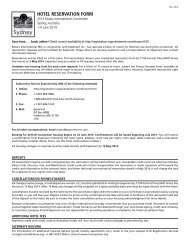DISCURSOS - Rotary International
DISCURSOS - Rotary International
DISCURSOS - Rotary International
Create successful ePaper yourself
Turn your PDF publications into a flip-book with our unique Google optimized e-Paper software.
We have always lived by our core values, the roots of the <strong>Rotary</strong> tree that make its branches<br />
spread far and wide and strong, through its more than 34,000 clubs. It is a big tree and growing<br />
bigger.<br />
Let me change gears a bit. While fellowship and diversity are our strengths, what really characterizes<br />
Rotarians is our focus on integrity, our commitment to high ethical standards in our businesses<br />
and professions, the morality and the values we uphold. I believe we do this better than any<br />
other organization, through our Avenue of Vocational Service. No other organization highlights this<br />
more than we do. I believe it is important that Rotarians serve as role models in our communities,<br />
and that must start with each one of us here in this room. The high standards we set — and<br />
the level to which we follow them — determine our credibility.<br />
I have often cited Gandhi’s story about the time he was in jail in the city of Nagpur in India. His<br />
wife, Kasturba, was allowed to see him once a week for one hour, when he would be brought<br />
out of his cell and allowed to meet her in a demarcated area. On one occasion, a new jail warden,<br />
out of respect for Gandhi’s privacy, left the two of them alone so that they could talk. But when<br />
he returned, there was Gandhi, holding his wife’s hand but not uttering a word. The jailer was<br />
perplexed. “Is anything wrong, Mr. Gandhi?” he asked. “Are you OK?” Gandhi smiled and said,<br />
“My dear man, you know the jail rules better than I. Prisoners are not supposed to talk to another<br />
person unless an official is present. How do you expect me to break the rules?”<br />
Was Gandhi being foolish? Impractical? Maybe. Following the righteous path may sometimes<br />
look foolish and impractical, particularly in the short term. But we all know that, in the long run,<br />
we can only weaken our society if we compromise on principles and values, whether legal or<br />
moral. And make ourselves very vulnerable, too.<br />
At a recent graduation ceremony at the Indian School of Business in Bangalore, the speaker<br />
urged the graduates to remember: Ethical behavior may seem difficult at times, even foolish, but<br />
if you compromise on ethics and integrity and doing what is right, I assure you that you will not<br />
go too far in your careers. The best way forward is to apply the highest standard of morality to<br />
your lives, and if you sometimes face a challenge, don’t change the standards but try to change<br />
your lives.<br />
Well, that speaker was certainly a Rotarian in spirit. We need to be always promoting the best<br />
practices in business as Rotarians, and be seen to be doing so, and it has to start with all of us<br />
here, in this room this morning.<br />
Integrity in life and in business is what started us in the first place. And fellowship and diversity<br />
are what bond us all together. But the main thing, the point of why we are here, why we all stay<br />
together in our clubs and in <strong>Rotary</strong>, has to be our work. It has to be the service, the difference we<br />
are making, whether we are working locally in our own communities or are engaged in bringing<br />
the whole world together — clubs and districts and governments and nongovernmental organizations<br />
and UN agencies and everyone else — to eradicate a disease from the earth, for example.<br />
Over the past few minutes, I have been talking about our core values and about service, because<br />
everything we do in <strong>Rotary</strong> as Rotarians and as the leaders that you are has to be based<br />
on these, and has to be based on trust. If you take all the qualities of a great leader and you sum<br />
them up in one word, that’s what that word would be: trust.<br />
You know that whatever happens, great leaders are not going to take more than their share of<br />
the credit or less than their share of the blame.<br />
If you go to them with a problem, they’ll be ready — and willing — to help. They’re not there to<br />
judge or criticize, they’re there to help you see the problem more clearly so that you can see it<br />
through.<br />
40 <strong>International</strong> Assembly Speeches 2013


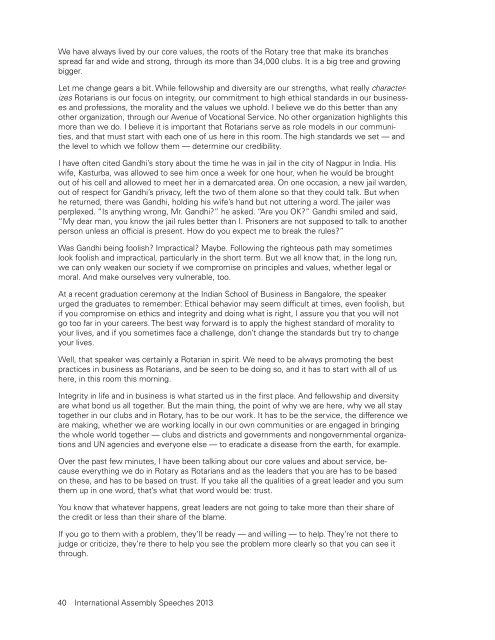
![La présidence du club [222-FR] - Rotary International](https://img.yumpu.com/25855726/1/190x245/la-presidence-du-club-222-fr-rotary-international.jpg?quality=85)

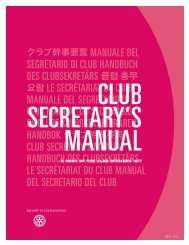




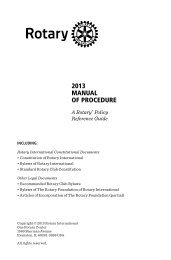


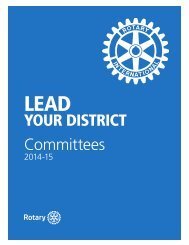

![La conférence de district [800-FR] - Rotary International](https://img.yumpu.com/25855636/1/190x245/la-conference-de-district-800-fr-rotary-international.jpg?quality=85)
